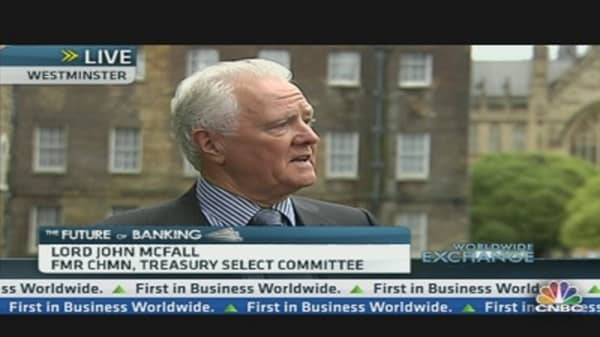The rapidly developing row over manipulation of inter-bank lending rates is turning into a battle over the future of banks around the world, analysts and politicans have warned.
“This is turning into a battle royale between 20 banks and potentially the Bank of England and other central banks,” Dan Conaghan, author of The Bank – Inside the Bank of England, told CNBC Wednesday.
“This is really about orderly markets and the relationship between commercial banks, investment banks and the central bank. The central bank has to decide if it’s above the market or intimately involved with it.”
The scandal over artificial lowering of the London interbank offered rate (Libor) has already claimed two high profile scalps at Barclays, Bob Diamond, the bank’s chief executive and Jerry del Missier, its chief operating officer.
On Tuesday, Barclays released a memo from Diamond suggesting that Paul Tucker, currently Deputy Governor of the Bank of England, had implied that Barclays could lower its rates in 2008, when Libor was being anxiously watched as a measure of the health of the banking system.
Diamond is expected to discuss the memo and the conversation with Tucker at his appearance in front of British MPs at the Treasury Select Committee at 14.00 (BST).
“I’ve never seen a meek and mild Bob Diamond. He’s always been an assertive character, but was he working for the greater good of the bank and society? That’s the issue that will lie behind this appearance,” Lord McFall, former head of the Committee, told CNBC.
He believes that officials from the Bank of England, and maybe the Treasury and government, should be hauled in front of the committee to discuss the events around the Libor manipulation.
Andrew Sentance, a former member of the Bank of England’s Monetary Policy Committee, defended the Bank’s actions.
“Our interest on the MPC was really to get an accurate fix on what was going on. It was difficult because banks weren’t able to access the markets as much,” he told CNBC.
“We’ve seen a massive amount of technological change and perhaps practices that seemed ok 10 or 15 years ago need to be updated to make sure we’re getting a proper fix on financial markets. The Bank of England has a very important role in monitoring what goes on in financial markets and it’s appropriate for them to talk to market players.”
The fallout from the scandal may include tougher regulation, after the government announced an inquiry into the matter.
“This is the worst of times for it (the scandal), given the background of the financial crisis,” McFall said.
“This was a huge issue (for the economy). It’s a global problem. Traders in London were talking to traders in New York and Tokyo. Given the size of the market, there are huge implications.”
Several politicians from the opposition Labour Party may have known about the lowering of rates, UK newspaper The Sun reported on Wednesday.
“The ability of the British political parties to ramp up what was a problem into a disaster is absolutely staggering,” Chris Roebuck, professor of transformational leadership at Cass Business School, told CNBC.
“We’ve effectively got a situation whereby maybe a couple of hundred people around the world were involved in this, but this government is demonizing an entire industry.”
“You can’t regulate people to have integrity,” he added.
Written by Catherine Boyle, CNBC.com. Twitter: @catboyle01





